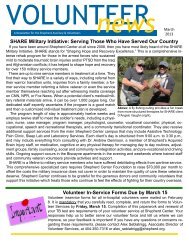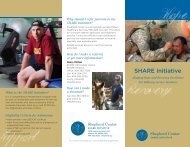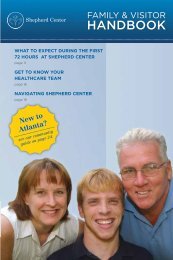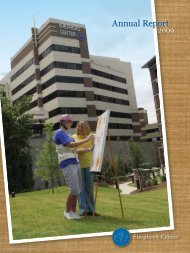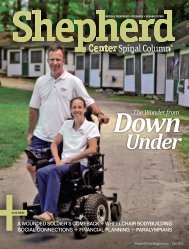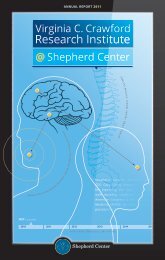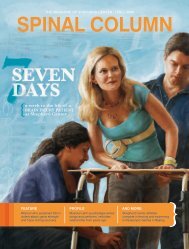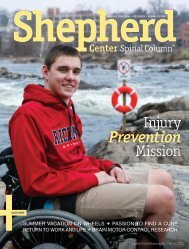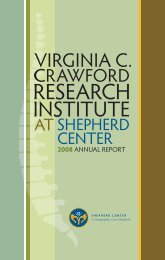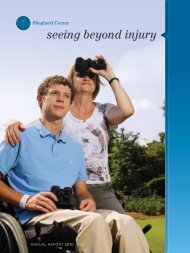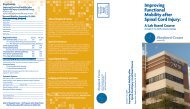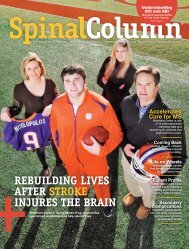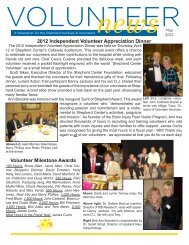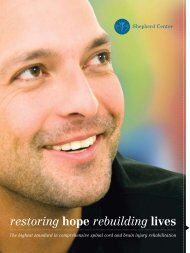AREAS OF INTEREST CHECKLIST - Shepherd Center
AREAS OF INTEREST CHECKLIST - Shepherd Center
AREAS OF INTEREST CHECKLIST - Shepherd Center
You also want an ePaper? Increase the reach of your titles
YUMPU automatically turns print PDFs into web optimized ePapers that Google loves.
<strong>AREAS</strong> <strong>OF</strong> <strong>INTEREST</strong> <strong>CHECKLIST</strong><br />
• We offer internships in our spinal cord injury program and our acquired brain injury<br />
program. Please rank your preference of the programs in which you would prefer<br />
your internship. If you have an equal preference, rank both as “1.” If you have no<br />
interest in one of the programs, please leave it blank<br />
___ spinal cord injury program<br />
___ acquired brain injury program<br />
• We also offer internships that are split between one of the above mentioned<br />
programs and one of our specialty programs. The specialty programs focus on<br />
specific areas of recreation and everything it takes to teach patients how this interest<br />
can be done given their disability. You only should consider a split internship if you<br />
have a very strong interest in professionally specializing in one of the below<br />
described program areas. If after reading the examples of the specialty programs<br />
you decide that you are interested in a split internship, please check the area(s) in<br />
which you are interested. If you do not have an interest in an area, please leave it<br />
blank.<br />
___ aquatics (i.e., swimming, water exercises, relaxation, scuba diving, water skiing)<br />
___ sports/fitness (i.e., basketball, tennis, golf, quad rugby, weight training, billiards,<br />
bowling, handcycling, hockey)<br />
___ outdoors (i.e., hunting, riflery, fishing, camping, boating, all terrain vehicles)<br />
• Please check the time of year for which you are applying for an internship.<br />
_____ Summer _____ Fall _____ Spring
fact sheet<br />
2020 Peachtree Rd. N.W. Atlanta, GA 30309 404-352-2020 shepherd.org<br />
THERAPEUTIC RECREATION<br />
Researchers have identified that involvement in recreation<br />
activities provides many benefits, some of which<br />
include increased physical fitness, increased self-confidence<br />
and increased social interaction. Research shows that productive<br />
and positive use of recreation time for someone<br />
with a disability is not only desirable, it is imperative.<br />
Attitude and activity strongly affect a person’s health and<br />
well-being. Involvement in positive and meaningful<br />
recreation activities assists with decreasing medical<br />
complications and the need for further medical intervention<br />
and /or hospitalization, and it is one of the best ways to<br />
adjust to lifestyle changes caused by a disability.<br />
WHO IS APPROPRIATE?<br />
Anyone who has acquired a disability and wishes to return<br />
to an active lifestyle.<br />
INITIAL ASSESSMENT<br />
Individuals are assessed to see what goals they have for<br />
themselves and what goals the Therapeutic Recreation<br />
Specialists finds appropriate for the individual. Once goals<br />
are agreed upon then individual sessions are set to work<br />
towards achieving these goals.<br />
• Time management<br />
• Community resources<br />
• Stigma management<br />
Leisure Skill Instruction<br />
Content Area<br />
• Explore Recreation Interest<br />
• Adaptive equipment<br />
• Adaptive techniques<br />
• Activity modifications<br />
• Recreation Resources<br />
COMMUNITY REINTEGRATION<br />
All learned information is combined to assist an individual<br />
with the confidence and knowledge to return to their community.<br />
Individuals with the support and guidance of the<br />
Therapeutic Recreation Specialists, learn how to function<br />
more independently and practice skills within their community.<br />
External resources are used whenever needed to assist<br />
in achieving a goal. Through the assistance of Therapeutic<br />
Recreation services individuals gain the confidence and<br />
knowledge to become active members of their community.<br />
THERAPEUTIC RECREATION SERVICES<br />
Leisure Counseling/Leisure Education<br />
Content Areas<br />
• Laws and rights<br />
• Meaning of wellness<br />
• Benefits of recreation<br />
• Problem solving techniques<br />
• Community accessibility<br />
• Self-advocacy<br />
• Transportation and Air travel<br />
REASSESSMENT AND FOLLOW UPS:<br />
Once an individual and their support system feel comfortable<br />
and knowledgeable with performing a goal, and the<br />
Therapeutic Recreation Specialists feels confident that they<br />
are successful with the goal it is considered met.<br />
CONTACT INFORMATION:<br />
For more information about Therapeutic Recreation services,<br />
call <strong>Shepherd</strong>'s Therapeutic Recreation Department at<br />
404-350-7375.<br />
Visit <strong>Shepherd</strong> <strong>Center</strong> online at www.shepherd.org.<br />
MKT09/10
SHEPHERD CENTER<br />
THERAPEUTIC RECREATION DEPARTMENT<br />
INTERNSHIP GUIDELINES AND GENERAL INFORMATION<br />
1. Prior to the student’s training at <strong>Shepherd</strong> <strong>Center</strong>, all necessary contracts, forms, paperwork, and<br />
certifications must be completed and on file, as outlined in <strong>Shepherd</strong> <strong>Center</strong>’s Clinical Affiliations policy.<br />
2. The student’s internship will last for a period of fifteen weeks. The student will be oriented to the center,<br />
center-wide staff and operations, and more specifically to the therapeutic recreation department<br />
operations and staff. This orientation is completed within the first 4-6 weeks of the student’s affiliation.<br />
3. No stipend is offered to the student. Responsibility for housing is that of the student. Assistance in<br />
locating housing is provided upon request.<br />
4. Work hours are generally Monday - Friday 8:00/9:00 am – 4:30/5:30 pm, with the possibility of 1-2<br />
evenings per week, and approximately one weekend per month.<br />
5. No uniform is required. Students will abide by the hospital’s policy and procedure for dress code.<br />
<strong>Shepherd</strong> <strong>Center</strong> attire will be available for students to purchase.<br />
6. Parking is available without charge.<br />
7. The student works with a patient/client population mainly consisting of spinal cord injuries or acquired<br />
brain injuries secondary to trauma. Experience with patient populations consisting of multiple sclerosis,<br />
transverse myelitis, and guillian barré is also a possibility.<br />
8. The student will be supervised by a certified therapeutic recreation specialist, as certified by the National<br />
Council for Therapeutic Recreation Certification.<br />
9. The student and supervisor will meet weekly, or more often if needed. The student is responsible to the<br />
supervisor for all patient/client contact. The student will be supervised on each new skill/responsibility<br />
that is done.<br />
10. The student will be responsible for meeting all expectations and completing all responsibilities as<br />
outlined in the intern job description.
Dear Student:<br />
We are pleased that you are interested in <strong>Shepherd</strong> <strong>Center</strong>'s Therapeutic Recreation<br />
Internship Program.<br />
All interns are supervised by a certified therapeutic recreation specialist, and all<br />
interns progressively experience the responsibilities of a full-time therapist. We<br />
require students to complete a 15-week internship. The number of internship<br />
positions offered depends on the time of the year for which you will be applying, as<br />
well as staff availability. Application deadlines are as follows:<br />
Summer - January 15<br />
Fall - April 15<br />
Spring - October 15<br />
All applications are held until the deadline date, and interviews are scheduled after<br />
reviewing the pool of candidates.<br />
Enclosed is literature about <strong>Shepherd</strong> <strong>Center</strong>, the Therapeutic Recreation<br />
department, internship guidelines, an internship job description, and an areas-ofinterest<br />
checklist. The following items must be submitted together in order for your<br />
application to be considered complete and to be reviewed:<br />
1. Resume<br />
2. Completed areas of interest checklist<br />
3. Goals/objectives of internship<br />
4. Strengths/areas for improvement<br />
5. Official Transcript<br />
6. Brief description of completed Therapeutic Recreation courses<br />
If you have any questions, I can be reached at 404-350-7793.<br />
Sincerely,<br />
Kelly Edens, C.T.R.S.<br />
Manager of the TR Department/Internship Coordinator<br />
Therapeutic Recreation Department
SHEPHERD CENTER<br />
THERAPEUTIC RECREATION DEPARTMENT<br />
INTERN JOB DESCRIPTION<br />
I. SUMMARY<br />
Provides supplemental assistance to the therapeutic recreation program while gaining professional work experience.<br />
II. QUALIFICATIONS<br />
1) Completed a majority of required therapeutic recreation and general recreation coursework.<br />
2) Signed contract on file from school.<br />
3) Necessary verbal and writing skills to communicate effectively.<br />
4) Evidence of recent physical exam and appropriate health screening.<br />
5) Evidence of health and personal liability insurance.<br />
6) Passed a background check and drug screening.<br />
7) Certified in Cardiopulmonary Resuscitation.<br />
III. JOB RELATIONSHIP<br />
Responsible to: Intern Supervisor<br />
IV. RESPONSIBILITIES AND EXPECTATIONS<br />
A. By the end of the internship, the intern will:<br />
1. Complete the TR competency packet.<br />
2. Maintain a personal caseload of 6-8 patients, completing all necessary treatment interventions,<br />
referrals, documentation, and scheduling.<br />
3. Plan, organize, and implement community reintegration outings<br />
4. Attend weekly team conferences.<br />
5. Attend scheduled goal setting conferences.<br />
6. Attend therapeutic recreation staff meetings.<br />
7. Attend therapeutic recreation inservices.<br />
8. Attend program meetings.<br />
9. Attend all relevant/required program inservices.<br />
10. Attend weekly meeting with supervisor. The intern should come prepared with questions/issues<br />
and should have all/any weekly assignments/documentation as outlined by the supervisor.<br />
11. Develop and present an inservice to the therapeutic recreation staff. This inservice should be a<br />
topic that is relevant and educational to the staff.<br />
12. Complete a long-term project that has on-going value to the therapeutic recreation department or<br />
program specific area within which the internship is being completed.<br />
13. Attend weekend camping trips and/or appropriate camps.<br />
14. Participate in family training.<br />
15. Teach one full rotation of leisure education classes.<br />
16. Complete the <strong>Shepherd</strong> <strong>Center</strong> Intern Program Evaluation<br />
B. Throughout the course of the internship, the intern will:<br />
1. Assure confidentiality of all patients.<br />
2. Conduct self professionally at all times<br />
3. Follow all <strong>Shepherd</strong> <strong>Center</strong> and therapeutic recreation policies and procedures.<br />
4. Provide support for all other therapeutic recreation staff and programs as assigned by supervisor.<br />
5. Assist staff in gathering patients for classes when needed.<br />
6. Report all concerns, questions, issues, etc., to supervisor.<br />
7. Be responsible for meeting all expectations and completing all responsibilities as outlined in the<br />
intern job description and internship expectations, and as assigned by supervisor.<br />
8. Keep your supervisor informed of all issues.<br />
9. Have your supervisor approve/proof everything before it is sent out internally or externally.
THERAPEUTIC RECREATION SERVICES<br />
“What you do during your working hours determines what you have...what you do during your<br />
leisure hours determines who you are.” --George Eastman<br />
Attitude and activity strongly affect a person’s health and well being, and involvement in<br />
meaningful recreation activities is one of the best ways to adjust to lifestyle changes caused by a<br />
disability. Studies show that therapeutic recreation (TR) improves functional outcomes during<br />
rehabilitation, and that it reduces the risk of post-discharge secondary medical complications,<br />
such as cardiovascular and respiratory problems, pain, and skin breakdown. At <strong>Shepherd</strong> <strong>Center</strong>,<br />
each patient/client admitted to an inpatient or day rehabilitation program is assigned a certified<br />
therapeutic recreation specialist (CTRS) as part of the treatment team. The CTRS determines<br />
when and at what level TR services are appropriate, and integrates them into the patient’s/client’s<br />
daily therapy schedule. The TR department also has program specialists who specialize in the<br />
following recreation areas: aquatics, art, horticulture, music, outdoors, and sports.<br />
Based on diagnosis, input from the rest of the team, and a leisure interests and needs<br />
assessment, an individualized treatment plan is developed that identifies the recreation goals for<br />
the patient/client. The overall goals of the TR department are to improve physical, cognitive,<br />
and/or social functioning, and to return the individual to as independent and active of a lifestyle as<br />
possible. These goals are achieved through the following therapeutic interventions:<br />
Leisure Counseling - individual or group sessions where topics can include, but are not limited to,<br />
community accessibility issues, problem solving, disability rights, self-advocacy, stigma<br />
management, travel, fundraising, time management, community resources, and recreation<br />
resources.<br />
Leisure Skill Instruction - individual or group sessions where individuals explore past or new<br />
recreation interests. They learn how they can return to these interests through the use of adaptive<br />
equipment, adaptive techniques, activity modification, compensatory strategies, and/or a variety of<br />
resources. Skill areas can include, but are not limited to, basketball, softball, power soccer, quad<br />
rugby, tennis, handcycles, snow skiing, weight training, billiards, bowling, ping pong, swimming,<br />
scuba diving, water skiing, jet skiing, all terrain vehicles, boating, fishing, camping, hiking, hunting,<br />
riflery, horseback riding, gardening, lawncare, landscaping, indoor plants, painting, drawing, crafts,<br />
ceramics, pottery, drama, photography, needlework, singing, musical instruments, video games,<br />
cards, reading, board games, and computers.<br />
Community Reintegration Outings - individual or group out-of-center sessions where a<br />
patient’s/client’s abilities and independence are tested in real-life situations. These outings are<br />
designed to help the individual adjust to the disability and re-enter society as quickly, as<br />
independently, and as easily as possible. Skills that patients/clients work on include, but are not<br />
limited to, practicing maneuvering their wheelchair in a crowd, curb management, money<br />
management, feeding, specific recreation skills, safety, learning how to ask for help when needed,<br />
dealing with accessibility issues, coping with public misconceptions, and solving barrier and<br />
obstacle problems. Outing destinations include restaurants, movies, museums, sporting events,<br />
shopping, the airport, and any recreation skill setting.<br />
Leisure Education Classes – group sessions where the following information is covered: the<br />
value and benefits of recreation, time use change after a disability, disability rights, how to handle<br />
discrimination, problem solving techniques, attitudes towards people with disabilities, and coping<br />
strategies.<br />
In addition to the above therapeutic interventions, patients/clients also are encouraged to use the<br />
evenings and weekends to pursue their interests as much as possible. For inpatients, a movie is<br />
shown every Saturday night, there is an educational program or social activity every Sunday<br />
afternoon, and patients can check out board games, movies, or video games to have in their<br />
room. For day program patients, they are encouraged to initiate involvement in activities of<br />
interest on their own/with family or friends.



